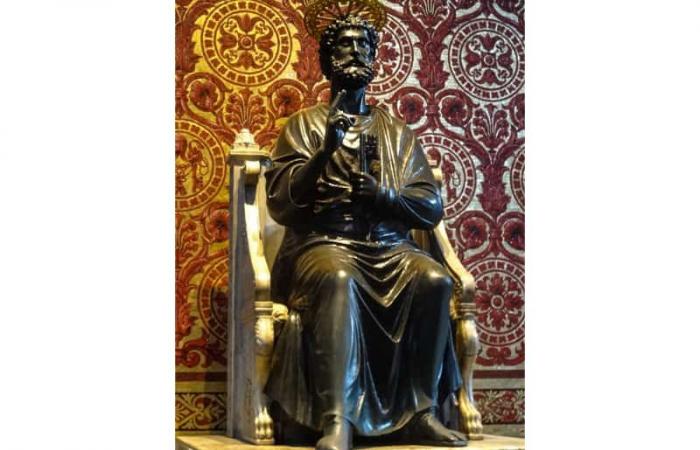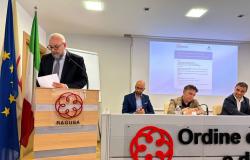Below I bring to the attention and reflection of the readers of this blog the article written by Father Raymond J. de Souza, published on National Catholic Register. Visit the site and freely evaluate the various options offered and any requests. Here is the article in the translation I edited.
“The Bishop of Rome“, a study document of the Dicastery for Promoting Christian Unity (DPCU) on papal primacy and ecumenism, combines a detailed account of recent theological developments with proposals that ignore the main ecclesial developments of recent years.
In his 1995 encyclical, Ut Unum Sint (So that they may be one), Pope John Paul II invited the other Christian Churches and ecclesial communities to rethink how the Petrine ministry can be exercised in the service of greater Christian unity. It was a bold call, but it did not generate a significant response from other Christian leaders.
In 2020, on the occasion of the 25th anniversary of the encyclical, the Dicastery for Promoting Christian Unity began a multi-year consultation process that produced the current 43,000-word document. Unable to obtain effective responses from other Christian pastors, the dicastery decided to commission its responses from the theological community.
The dicastery describes it as “the fruit of almost three years of truly ecumenical and synodal work”:
“The document summarizes approximately 30 responses to the Ut Unum Sint and 50 ecumenical dialogue documents on the topic. It involved not only the officials, but also the 46 members and consultants of the Dicastery who discussed it in two Plenary Meetings. The best Catholic experts on the subject and numerous Orthodox and Protestant experts were consulted, in collaboration with the Institute of Ecumenical Studies of the Angelicum”.
A review of the most recent studies and research is certainly useful for operators in the sector. Trying to understand why John Paul’s invitation remained largely unheard is necessary. But the proposals – and they are only proposals – of the Dicastery for Promoting Christian Unity have something of an “ivory tower”, very distant from the actual reality of Christian unity today.
Synodality is not a solution
The full title of the document suggests hypotheses about how things might be rather than how they actually are: “The Bishop of Rome: Primacy and synodality in ecumenical dialogues and responses to the encyclical Ut unum sint.”
Synodality is fashionable in Rome, but it was never mentioned in Ut Unum Sint. Furthermore, synodality today does not produce unity but division. Synodal structures have existed for a long time and therefore it is not certain that synodality always produces division, but now it does.
The fact that the Dicastery for Promoting Christian Unity proposes that greater synodality will lead to Christian unity ignores important developments in the Christian world, which occurred just as the Dicastery was assembling its research materials:
- The Orthodox Churches – which are governed by synods – are no longer in communion with each other. Moscow, the largest Orthodox Church, has excommunicated Constantinople and Kiev.
- Equally ignored is the fact that in 2023 many Anglican Primates – who make up 80% of the global Anglican Communion – have declared that they no longer recognize the Archbishop of Canterbury as an “instrument of communion”. The Vatican chose to pretend this didn’t happen, hosting Archbishop Justin Welby and the meeting of primates earlier this year as if nothing had changed. But the Anglican Communion – also governed by synods – no longer exists.
- The Coptic Orthodox Church – another synodal church – severed ecumenical relations with Rome just a few months ago over the Vatican’s alleged approval of blessing same-sex couples.
- The process of the “synodal path” in Germany has produced serious divisions between the Holy Father and the German bishops. Synodality is currently eroding Catholic unity ad intra. Why then should the DPCU propose to expand it ad extra?
- In a few weeks, the second largest of the Eastern Catholic rites, the Syro-Malabar Church, may face the excommunication of several priests over a long-standing liturgical dispute. In case of mass excommunications, a schism is possible. The Syro-Malabar Church is governed by a synod.
Synodality is probably going through the greatest crisis in its history. The urgent task of Christian pastors is to contain the damage, not to broaden its impact.
The study document speaks of synodality and primacy in abstract terms. The reality of the 21st century is division, not unity. It is theoretically possible that a more synodal exercise of papal primacy could lead to ecumenical progress, but this is simply not the case today, nor in the foreseeable future. The document of the Dicastery for the promotion of Christian unity therefore remains an interesting intellectual exercise, but it has no pastoral application today.
It should also be remembered that the synod assembly of October 2023 found that there is no agreement on the meaning of synodality. Indeed, a Vatican working group was established earlier this year to try to find meaning for synodality. If the Vatican does not understand the meaning of synodality, it cannot be useful in rethinking papal primacy.
Vatican I and Vatican II
Although the First Vatican Council (1869-1870) is best known for defining papal infallibility, its teaching on “universal jurisdiction” has been more important in the daily life of the Church.
Vatican I made clear that the Pope has authority over the entire Church – full, immediate and ordinary power. Upon closer inspection, this is a maximalist interpretation of the Petrine office. The Dicastery for Promoting Christian Unity believes that this could constitute a problem and instead proposes:
“a Catholic “re-reception”, a “reinterpretation”, an “official interpretation”, an “updated commentary” or even a “reformulation” of the teachings of Vatican I. In fact, some dialoguers observe that these teachings have been profoundly conditioned by their historical context, and suggest that the Catholic Church should seek new expressions and a vocabulary faithful to the original intention, but integrated into a communio ecclesiology and adapted to the current cultural and ecumenical context”.
“Reformulating” the teaching of an Ecumenical Council is an important task, which another Ecumenical Council may wish to address. Fortunately for the Dicastery for Promoting Christian Unity, Vatican II did exactly that, integrating Vatican I’s teaching on the papal office with the collegiality of bishops, who together live the communio of the Church. In 1995, John Paul actually thought that the ecclesiology of Vatican II’s communio offered the path forward. This would seem to be a more fruitful path than reformulating the teaching of Vatican I.
Backwardism?
Another case in which the study document ignores current realities is that Pope Francis has taken two steps backwards from the communio approach of Vatican II.
First, his summary removal of bishops. Of course, the discipline and removal of bishops is often very popular; many voices think that the Holy Father should do more. However, the removal of a bishop, especially if the process is obscure or arbitrary, is animated more by the spirit of Vatican I than by that of Vatican II. Christians now separated from Rome would probably not be thrilled with a papal primacy that can dismiss bishops as if they were local subordinates.
Second, in his reform of the Roman Curia, Pope Francis decided that government can be exercised by lay people, meaning that authority does not come from the office of bishop, but rather from a delegation from the Holy Father himself. This is a highly contested and unofficially defined point of view by experts in Catholic canon law.
However, the idea that authority derives from a papal mandate rather than from participation in the apostolic succession is a step backwards from Vatican II towards Vatican I. Such a backward approach is unlikely to be attractive to other Christians in the exercise of the papal office.
The “study document” is a useful academic contribution. But it is the type of theological work that Pope Francis often denigrates as “desk theology,” distant from the real life of Christian people.
Father Raymond J. de Souza
The opinions expressed in this article are those of the author and do not necessarily reflect those of the person responsible for this blog. The contributions published on this blog, considered worthy of importance, have the sole and exclusive purpose of making people reflect, fueling the debate and deepening reality. If the authors of the articles relaunched here do not like the publication, they just have to let me know. Items will be deleted immediately.
Choose the donation amount
10152025304050100200300







